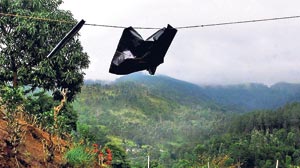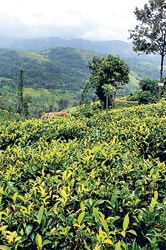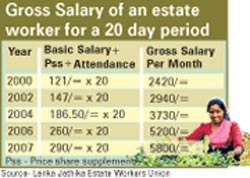| Estate workers are continuing with their trade union action, demanding their basic salary be increased to Rs. 500 from Rs. 290, in view of the increasing cost of living. “The collective agreement signed with the Regional Plantation Companies on the matter of wage increases for estate workers expired in March, and since then we have had several rounds of talks, the last meeting held only a week ago,” Ceylon Workers’ Congress (CWC) national organiser Ramiah Yogarajan told the Sunday Times.
 |
 |
| A black flag and a deserted tea estate in Pussellawa indicate go-slow trade union action. |
“But the plantation companies said they haven’t discussed the issue among themselves, and needed more time. They also said they cannot meet our demand. Even after five months they haven’t come up with a proposal for the estate workers’ salary increase, which is unacceptable. We thought we should put some pressure on them.”
Lanka Jathika Estate Workers’ Union (LJEWU) general secretary K. Velayudam said many other trade unions have joined in the trade union action. “Most of the estate workers have joined in. In fact, the original trade union action of non-co-operation has been extended to a work-to-rule campaign by workers who have joined in,” he said.
Mr. Velayudam said the Employers’ Federation of Ceylon (EFC) has sent letters demanding that the trade union action be terminated immediately. However, the trade unions would continue to press for action, he said, until a proper proposal was presented when the parties meet the Regional Plantation Companies tomorrow.
“The Regional Plantation Companies are collecting huge sums of money for the tea produced by the workers, but the estate workers do not get any benefit,” the CWC’s Mr. Yogarajan said. “Since the last collective agreement, the cost of living has increased by 55 per cent, so they have to give the workers a salary increase. If the cost of electricity or fertiliser goes up, the Regional Plantation Companies will not refuse to pay the increased costs. The estate workers should be given a reasonable wage in consideration of the current cost of living.”
According to the EFC’s Mr. Velayudam, the government and the Plantation Human Development Trust Fund (PHDT) were providing most of the welfare programmes for estate workers. These initiatives included housing, health, education and roads.
“The plantation companies do not hold sole responsibility for providing welfare facilities for estate workers,” Mr. Velayudam said. “So they cannot say they provide facilities and therefore cannot increase the wages. The latest World Bank report on Sri Lanka states that the plantation sector workers are the poorest in the country. The wage hike should be given based purely on humanitarian grounds.”
Mr. Velayudam said the government does not provide the estate workers with any subsidies or “samurdi”. (The Samurdhi Programme is a national programme to alleviate poverty in the country.) “The government should play a more active role in estate sector welfare,” he said. “The cost of living is extremely high. The situation demands the government steps in and gives the estate workers a subsidy for essentials, such as wheat, flour and sugar.”
Minister of Plantation Industries D. M. Jayaratne told the Sunday Times that the government had given the Regional Plantation Companies tax concessions on condition they took responsibility for the estate workers’ welfare, rather than the government having to do so. He said the government would intervene in the negotiations only if the authorities were convinced that not giving a wage increase would have a negative impact on estate workers’ lives or the country’s economy.
“The negotiations do not concern us directly,” Minister Jayaratne said. “This is between the Regional Plantation Companies and the estate workers. We expect both parties to work out a solution without compromising the interests of either party. If there is a problem, we will intervene later.”
Meanwhile, the Planters’ Association of Sri Lanka has issued a statement warning that any disruptions on estates caused by trade union action could have an adverse impact on the country’s economy and security. The statement said work would be suspended on estates where trade union action was being carried out, and that if estate operations were terminated, the firms would not be able to pay the workers their wages.
The statement quoted Planters’ Association general secretary Malin Goonatilake as saying that if the companies were unable to deliver the produce already paid for by overseas buyers, there would be an unprecedented negative impact. “It will affect our reputation and will move buyers away to other countries. …” he stated.
|



